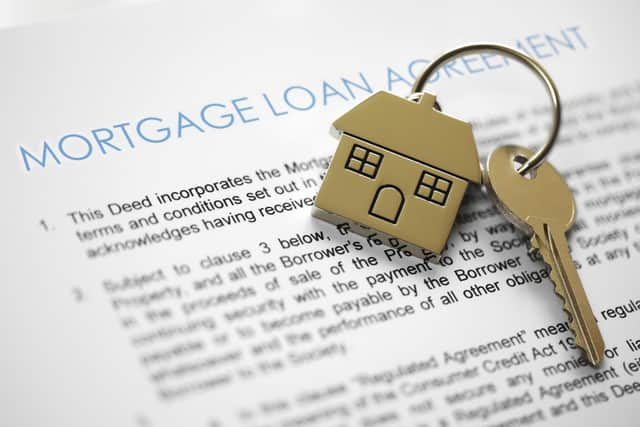Sound advice on how to cope with rising mortgage interest rates
Predictions are that mortgage payments will rise to an average of 30 per cent of income as opposed to 20 per cent. There are also reports of an increase in the number of people taking out 35 and 40 year mortgages to bring down the cost of monthly mortgage payments even though long-term the overall cost will be significantly higher.
Richard Donnell, executive director at Zoopla, says the interest bill on longest term mortgages is about 45 per cent or £80,000 higher than on a 25 year loan for the average buyer.
Advertisement
Hide AdAdvertisement
Hide AdHe also suggests that first time buyers should purchase a three-bedroom home that they are going to stay in for the long term. You can, also, of course, now reduce the term of the mortgage later if rates settle down and you are in a better position financially


Yorkshire Post columnist Andrew Mlnes, business principal of the Mortgage Advice Bureau, Bingley, says: “There is no doubt that the cost of borrowing has risen by more than expected over the last week or so.
“We have seen six or seven mainstream lenders increase their pricing on two and five year fixed rate mortgage deals and a couple of lenders pull out of the market completely whilst they reassess things.
“This is an obvious reaction to the inflation figures that were released last week which, whilst reporting a drop in the overall rate of inflation, was not at the level predicted and hoped for.
Advertisement
Hide AdAdvertisement
Hide Ad“The positive news is that lenders still have an appetite to lend, even at the higher loan to value end of the market in certain circumstances and Skipton building society’s track record mortgage is a case in point.”
He adds that while the cost of your mortgage is important in terms of affordability, this should only be one of the factors taken into consideration when buying a home.
He suggests that in the short term it may be possible to mitigate the higher interest rate by borrowing the money over a longer period with plans to overpay or shorten the term in the future.
“Although this is not an ideal scenario, if it helps people obtain the property most fit for their circumstances at the time, it may be a viable option,” says Andrew, who adds: “It will be interesting to see what the Bank of England decides to do on June 22.
Advertisement
Hide AdAdvertisement
Hide Ad“If you had asked me the question a month ago, just after the May meeting, I would have suggested to you that we had seen the last of the Bank of England base rate rises and we might even have seen some reductions to it in the third and fourth quarter of the year.
“However, given where the current inflation figures are and the Bank of England’s mantra of trying to get this down below two per cent , it’s very unlikely we will see anything but a rise to around five per cent in interest rates.”
There is, though, hope that there will be some reductions in the bank base rate towards the end of this year and Andrew stresses that, unlike the issues in 2007 and 2008, this is not a liquidity crisis and banks do have money to lend, it’s just going to cost you more.
For those struggling with mortgage payments then the advice is do not bury your head in the sand. Be upfront with the lender as soon as possible and explore the possibility of a mortgage holiday.
Advertisement
Hide AdAdvertisement
Hide AdThere may also be an opportunity to extend the term of your mortgage to bring the cost of monthly payments down to a manageable level. You can, also, of course, reduce this term later when interest rates calm down and you are in a better position financially.
For more information on what to do when you are struggling to pay your mortgage, then contact your lender straight away to ask for help and advice. They may also suggest reducing your repayments or taking a break from them for a limited period of time or switching temporarily to an interest-only mortgage.
The Money Saving Expert website has a great section on what you can do to help the situation. For details visit www.moneysavingexpert.com/mortgages/mortgage-arrears-help/